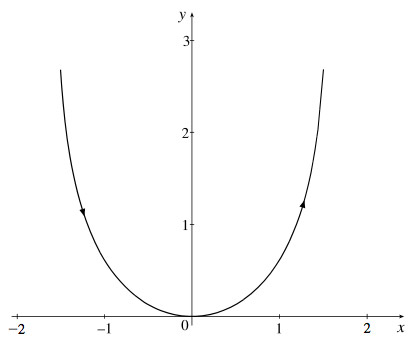09.7 - the Grim Reaper curve
Consider the curve $\myv r(w)=w\uv i-\ln(\cos w)\uv j$ on the interval $-\frac{\pi}{2} \lt w \lt \frac{\pi}{2}$.
- Compute the vector $\myv r'(w)$, which is tangent to the curve at $\myv r(w)$. For each value of $w$ in
$\{-\frac{\pi}{3},-\frac{\pi}{4},-\frac{\pi}{6},0,\frac{\pi}{6},
\frac{\pi}{4},\frac{\pi}{3}\}$
 sketch a tangent vector.
sketch a tangent vector.
$$\myv r(w)=\myc{w, -\ln(\cos w)}\equiv\myc{x(w),y(w)}.$$ Therefore the derivative vector is $$\myv r'(w)\equiv\myc{\frac{d}{dw}x(w),\frac{d}{dw}y(w)}=\myc{1,\frac{\sin w}{\cos w}}.$$ Computing two values...$w=0$: $$\myv r(0)=\myc{0, -\ln(\cos 0)}=\myc{0,0}.$$ $$\myv r'(0)=\myc{1,\frac{\sin 0}{\cos 0}}={1,0}$$
$w=\frac \pi 3$: $$\myv r(\pi/3)=\myc{\pi/3, -\ln(1/2)}\approx\myc{1.05,0.69}.$$ $$\myv r'(0)=\myc{1,\frac{\sin(\pi/3)}{\cos(\pi/3)}}=\myc{1,\sqrt 3}\approx\myc{1,1.73}$$
- For any value of $w$, what angle does $\myv r'(w)$
make with the $x$-axis?
Call the angle with the $x$-axis "$\theta$". Draw a right triangle, and you can hopefully readily see that, for any 2-d vector $\myv v$: $$\tan\theta=\frac{v_y}{v_x}$$
So, we divide the $y$-component of our tangent vector by its $x$-component: $$\tan\theta = \frac{\sin w}{\cos w}\equiv\tan w$$ Oh, one definition of tangent of $w$ is just $\sin w/\cos w$. So based on the equation above, the angle that we're looking for is nothing other than $$\theta = w.$$
- Find a vector function $\myv N(w)$ (does not have to be a unit vector), which is normal to (perpendicular to) $\myv r'(w)$ and points towards the "inside" of the curve (or equivalently, has a positive $y$-component).
You may remember that two lines with slopes $m_1$ and $m_2$ are perpendicular to each other if $m_1m_2=-1$. Or, if we have a line with slope $m_1$, then a second line with slope $m_2=-1/m_1$ will be perpendicular. The "slope" is the same as the tangent of the angle with the x-axis.
Seeing as how the slope of our tangent line is $\tan w=\sin w/\cos w$, we should like a vector with a ratio of $N_y/N_x=-1/(\sin w/\cos w)=-(\cos w/\sin w)$. For example $\myv N=\myc {-\sin w, \cos w}$. (Another choice, $\myv N=\myc{\sin w, -\cos w}$ is also perpendicular to the curve.)
Mathematical history
The grim reaper is an ancient solution to the problem of "curve-shortening flow". The idea is to move every point on a curve:
- with a speed which is proportional to the curvature at that point,
- in a normal direction from the curve,
- in the convex direction.
See for example:
Perhaps you can imagine that with these rules:
- A line will not change at all, since its curvature is everywhere 0.
- Any convex, closed loop will eventually evolve towards a circle, and will eventually disappear,
The grim reaper has the peculiar property that it will move under curve-shortening flow, but its shape will remain unchanged.